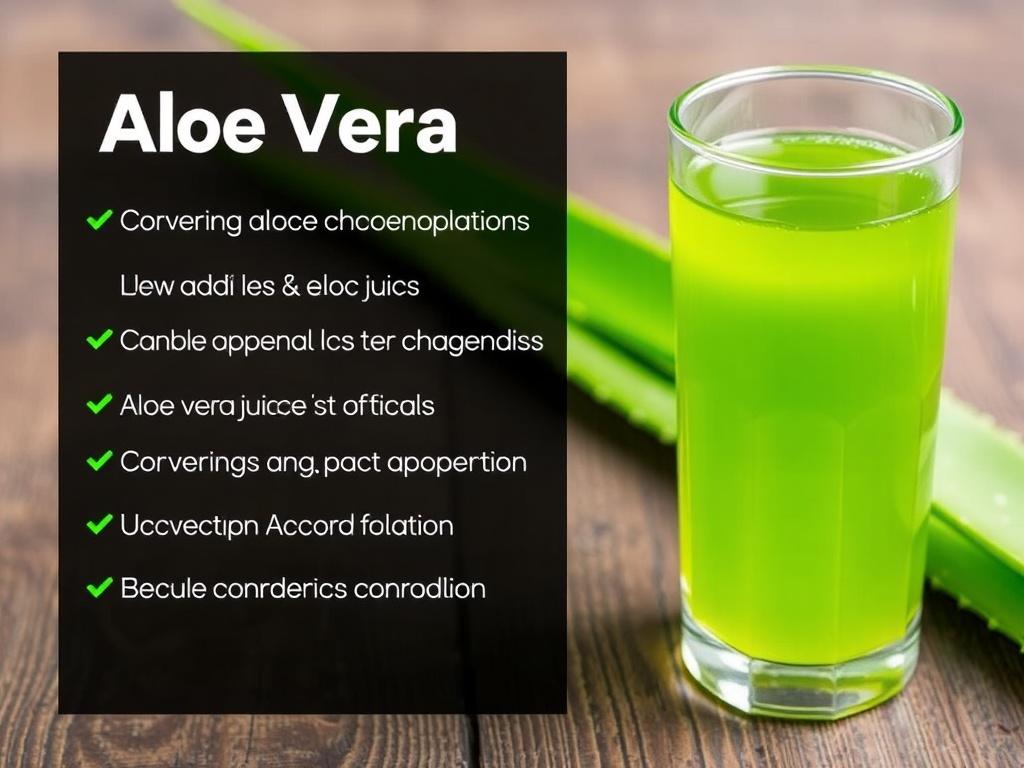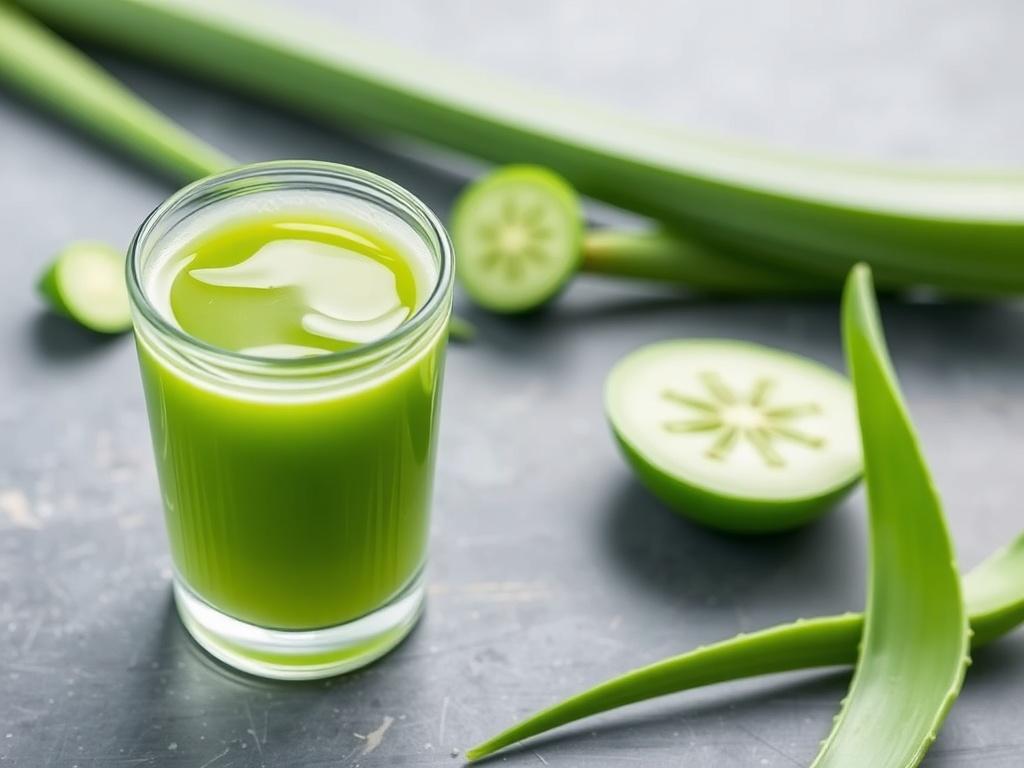Aloe vera juice has enjoyed a surge in popularity over the past decade, popping up in health stores, smoothies, and wellness blogs. You might have seen bottles promising clearer skin, reduced inflammation, or a detoxifying boost, but one of the most compelling and evidence-backed uses of aloe vera juice is its benefits for the gut. If you’ve ever wondered whether this plant-based drink can soothe an upset stomach, help with digestion, or support a healthier gut microbiome, this long-form guide will walk you through what aloe vera juice does, how it works, who might benefit, and how to use it safely.
This article is written to be practical and conversational. We’ll explore the science behind aloe vera and digestion, compare different forms of aloe vera juice, provide step-by-step guidance for preparing and using it, and offer safety tips so you can make an informed choice. Whether you’re curious about aloe vera for IBS, looking for ways to ease constipation, or simply want to understand how aloe vera and gut health interact, read on—we’ll cover this topic comprehensively and clearly.
What Is Aloe Vera Juice?

Aloe vera juice is the liquid extracted from the leaves of the aloe vera plant. The plant itself is a succulent, with thick leaves filled with a clear gel and a thin layer of yellowish latex just beneath the skin. When people talk about aloe vera juice, they’re usually referring to the gel part instead of the latex, although some commercial products include both.
Aloe vera juice for digestion typically uses processed gel that has been stabilized to preserve active compounds. This juice contains a mix of water, vitamins, minerals, amino acids, enzymes, and unique polysaccharides like acemannan. These compounds are believed to contribute to the soothing, anti-inflammatory, and possibly antimicrobial properties that make aloe vera appealing for gut health.
A brief history: From ancient remedy to modern supplement
Humans have used aloe vera for thousands of years. Ancient Egyptians called it the “plant of immortality” and applied it to wounds and burns. Across cultures, aloe has been used topically and internally for a range of ailments. In modern times, aloe vera juice has been marketed both as a traditional remedy and as a product with specific benefits for digestion and gut health.
How Aloe Vera Affects the Gut: The Science Explained

Understanding how aloe vera juice benefits the gut requires a look at several biological effects: anti-inflammatory action, mucosal healing, effects on gut motility, and interactions with gut microbes. While research is ongoing, a growing body of evidence supports some real benefits, balanced by important cautions.
Anti-inflammatory and mucosal-supporting properties
One of the most important ways aloe vera can help the gut is by reducing inflammation and supporting the mucosal lining. Chronic inflammation of the digestive tract can cause pain, irregular bowel movements, and conditions like inflammatory bowel disease (IBD). Aloe vera contains compounds such as polysaccharides and glycoproteins that may reduce inflammatory markers and support the regeneration of mucous membranes. This is why some people with conditions like ulcerative colitis report symptom relief with aloe vera juice.
Enzymes and digestion
Aloe vera juice contains enzymes that may help break down sugars and fats, potentially aiding digestion. These enzymes can support the digestive process, making it easier for your body to absorb nutrients and reducing the burden on your digestive tract.
Effect on gut motility: laxative vs. gentle regulation
This is a nuanced area. The latex part of aloe vera (a thin yellow sap beneath the leaf skin) contains anthraquinones like aloin, which have strong laxative effects. Historically, aloe latex was used to treat constipation. However, processed aloe vera juices designed for daily consumption often remove or reduce aloin because of safety concerns with long-term use.
The gel itself, in contrast, can help normalize bowel function—easing constipation for some people without causing severe cramping or diarrhea when used appropriately. That balance is one reason product formulation matters so much.
Prebiotic and microbiome interactions
Emerging research suggests aloe vera polysaccharides may act as prebiotics—feeding beneficial gut bacteria and supporting a healthier microbiome. A balanced microbiome plays a critical role in digestion, immune function, and even mood. While more human studies are needed, early laboratory and animal studies show promising interactions between aloe compounds and beneficial gut microbes.
Who Can Benefit from Aloe Vera Juice for the Gut?

Aloe vera juice isn’t a universal cure; it’s most useful for specific situations. Here are groups of people who may see benefits:
- Those with occasional indigestion or mild heartburn looking for a gentle, plant-based remedy.
- People with constipation who need a natural option (preferably short-term and with low or no latex/aloin content).
- Individuals with inflammatory gut conditions—like mild ulcerative colitis—who find symptom relief after discussing aloe with their healthcare provider.
- Anyone seeking to support gut lining health or explore prebiotic food sources to nourish their microbiome.
While some people report improvements in IBS symptoms with aloe vera for IBS, results vary. It’s best approached as part of a broader strategy that includes dietary changes, stress management, and medical guidance.
Who should avoid or use caution?
Aloe vera juice isn’t for everyone. Avoid or use caution if you are:
- Pregnant or breastfeeding—internal use is not recommended because certain compounds may stimulate uterine contractions or otherwise be harmful.
- Taking medications—aloe vera can interact with blood thinners, diabetes medications, diuretics, and others.
- With kidney disease or electrolyte imbalance—prolonged use of latex-containing products can cause electrolyte disturbances.
- Sensitive to laxatives or with chronic diarrhea—latex may aggravate symptoms.
Always consult your healthcare provider before beginning a regular aloe vera juice regimen, especially if you have chronic conditions or take multiple medications.
Evidence Snapshot: What Studies Say

Research into aloe vera juice benefits for the gut includes laboratory studies, animal studies, and human clinical trials. Results are mixed but promising in several areas.
- Inflammatory bowel diseases: Several small human trials suggest aloe vera gel may help reduce symptoms in ulcerative colitis, lowering clinical disease activity scores in some participants.
- Constipation and bowel function: Aloe latex has a history as a laxative; some studies indicate aloe gel can improve constipation for certain people when used correctly.
- Peptic ulcers and mucosal healing: Animal and lab studies show aloe may speed mucosal healing, but robust human trials are limited.
- Microbiome impacts: Preliminary lab and animal studies suggest prebiotic and antimicrobial activity that could modulate gut flora positively, though human data are sparse.
The overall picture: aloe vera has biologically plausible mechanisms that could benefit gut health, but outcomes depend on formulation, dose, and individual differences. Larger, high-quality human trials are needed to confirm long-term benefits and optimal usage.
Choosing the Right Aloe Vera Juice

Not all aloe vera juices are created equal. Ingredients, processing, and labeling make a big difference in safety and effectiveness. Here’s what to look for when buying aloe vera juice for the gut.
Key labeling and ingredient terms
- Decolorized or purified aloe vera: This indicates removal of latex compounds like aloin, which can reduce laxative effects and potential toxicity.
- Inner leaf gel vs. whole leaf: Inner leaf gel products usually emphasize the mucilaginous gel; whole leaf extracts may include latex unless processed to remove it.
- Aloe vera concentrate vs. pure juice: Concentrates may have added water, sweeteners, or flavorings—check for added sugars or preservatives.
- Standardized polysaccharide content or acemannan level: Some higher-quality products quantify active components linked to health effects.
Tips for selecting a product
- Choose a brand that specifies “aloin-free” or “decolorized” if you want to avoid laxative effects and long-term risks.
- Avoid products high in added sugars—especially if using aloe vera juice regularly.
- Look for organic certification if pesticide exposure concerns you.
- Check for third-party testing or certifications that verify purity and active compound levels.
How to Prepare and Use Aloe Vera Juice: Step-by-Step

If you decide to try aloe vera juice for digestion, you can buy commercial products or make fresh juice at home. Both have pros and cons. Below is a step-by-step guide for home preparation and a suggested introductory dosing plan.
Making fresh aloe vera juice safely
Using fresh aloe leaves can be rewarding, but you must remove the latex properly and work cleanly.
- Choose a mature aloe vera plant (at least 2-3 years old) and pick thick outer leaves.
- Wash the leaf and trim off the thorny edges along the sides.
- Slice the leaf lengthwise and use a spoon to scoop out the clear inner gel, avoiding the thin yellow layer (latex) beneath the skin.
- Rinse the gel to remove any residual latex—rubbing under running water helps.
- Optional: Blend the gel with water, coconut water, or mild juice for flavor and consistency. Strain if you prefer a smoother texture.
- Store in the refrigerator and use within a couple of days for best freshness.
Suggested introductory dosing and frequency
Start small when introducing aloe vera juice into your routine.
- Begin with 1–2 ounces (30–60 ml) once daily, taken with or after a meal.
- If tolerated, gradually increase to a maximum of 4 ounces (120 ml) per day for short periods.
- Use low- or no-latex/aloins products for regular daily use; reserve latex-containing preparations for occasional constipation relief under supervision.
- Watch for changes in bowel habits, cramping, or allergic reactions and stop use if any concerning symptoms appear.
Recipes and Ways to Use Aloe Vera Juice for Gut Health

Aloe vera juice is versatile. Here are several simple and tasty ways to incorporate it into your life.
Basic aloe refresher
- 2 oz (60 ml) aloe vera juice
- 6–8 oz (180–240 ml) coconut water or plain water
- Fresh squeeze of lemon or lime
- Optional: a pinch of sea salt (helps with mineral balance)
- Mix and serve chilled.
Soothing morning smoothie
- 1 oz (30 ml) aloe vera juice
- 1 cup plain yogurt or a dairy-free alternative (yogurt adds probiotics)
- 1 banana
- 1 tbsp chia seeds
- Optional: 1 tsp honey
- Blend until smooth. This combines prebiotic aloe with probiotic yogurt for gut synergy.
Gentle aloe tea
- 1 cup warm water
- 1 oz aloe vera juice
- Fresh grated ginger or a chamomile tea bag
- Steep and sip slowly—great for calming the stomach.
Comparing Forms: Table of Aloe Vera Products

Below is a simple comparison table to help you weigh options when choosing aloe vera juice for the gut.
| Form | Description | Gut Benefits | Drawbacks |
|---|---|---|---|
| Inner leaf gel (fresh) | Fresh gel scooped from leaf; typically aloin removed if rinsed well | High in mucilage and polysaccharides; gentle mucosal support | Short shelf life; risk of residual latex if not cleaned properly |
| Decolorized/purified commercial juice | Processed to remove latex and reduce bitterness | Safe for regular use; supports digestion and inflammation reduction | Quality varies; watch for added sugars and additives |
| Whole leaf extract | Made from entire leaf; may contain latex constituents unless treated | Strong laxative effect if latex present; can relieve constipation quickly | Not recommended for long-term use; potential safety issues |
| Powdered aloe supplements | Dried and powdered gel or extract in capsules or packets | Convenient; controlled dosing | Processing may alter active components; quality control matters |
Safety, Side Effects, and Interactions

Aloe vera juice can be beneficial, but it’s not without risks. Understanding side effects and interactions will help you use it wisely.
Common side effects
- Digestive upset: cramping, diarrhea, or abdominal pain—especially with latex-containing products.
- Allergic reactions: skin rash or breathing difficulties in sensitive individuals; topical allergy may indicate systemic risk.
- Electrolyte imbalance: prolonged laxative use (from latex/aloins) can lower potassium and cause weakness, irregular heartbeat, or other issues.
Serious risks and when to seek help
If you experience severe abdominal pain, persistent diarrhea, fever, or signs of allergic reaction (swelling, difficulty breathing), stop use immediately and seek medical care. Long-term consumption of laxative aloe products has been linked to potential risks, including kidney issues and increased cancer risk in animal studies for certain compounds—another reason to avoid chronic use of high-aloin formulations.
Drug interactions
Aloe vera juice can interact with medications. Notable interactions include:
- Diabetes medications: aloe may lower blood sugar and amplify medication effects, risking hypoglycemia.
- Blood thinners: potential to affect coagulation in some cases.
- Diuretics and other drugs that affect potassium: interaction with aloe-induced electrolyte changes may be harmful.
- Digoxin and similar compounds: electrolyte disturbances can change the way these drugs act.
Always tell your healthcare provider about any supplements you’re taking, especially if you have chronic conditions or take prescription drugs.
How to Integrate Aloe Vera Juice Into a Gut-Healthy Routine

Aloe vera juice can be part of a broader approach to gut health that emphasizes whole foods, stress management, and sleep. Think of aloe as one supportive tool, not a standalone cure.
Daily habits for a healthier gut
- Eat a diverse diet rich in fiber from fruits, vegetables, legumes, and whole grains to feed beneficial microbes.
- Include fermented foods—like yogurt, kefir, sauerkraut, and kimchi—for probiotics.
- Stay hydrated and move regularly—both affect digestion and bowel regularity.
- Manage stress through mindfulness, gentle exercise, or breathing practices—stress increases gut inflammation.
- Consider aloe vera juice as a supplement to these habits: use low-latex products for daily support, or reserve stronger latex preparations for short-term constipation relief under supervision.
Practical routine example
Here’s a simple routine that includes aloe vera juice for someone seeking gut support:
- Morning: 1 oz aloe vera juice mixed into a probiotic yogurt smoothie (yogurt + banana + oats + 1 oz aloe).
- Midday: Balanced lunch with fiber-rich vegetables, lean protein, and healthy fats to support digestion.
- Evening: If needed, a warm aloe tea with ginger to soothe the stomach before bed.
- Weekly: Monitor bowel patterns, energy, and symptoms; adjust aloe dose or frequency as needed.
Frequently Asked Questions

Can aloe vera juice cure IBS?
Aloe vera for IBS shows mixed results. Some people report symptom relief, especially for constipation-predominant IBS, but clinical studies are inconclusive. IBS is multifactorial and individualized; aloe may help some people as part of a broader management plan that includes dietary adjustments and stress reduction.
Is aloe vera juice safe every day?
Daily use of purified, decolorized aloe vera juice that is low in aloin can be safe for many adults at moderate doses. However, long-term use of latex-containing or high-aloin products is not recommended. Always start with small doses and consult a healthcare provider if you plan daily use.
Will aloe vera juice interfere with my medications?
Possibly. Aloe can interact with blood sugar medications, diuretics, digoxin, and blood thinners. Ask your provider or a pharmacist about specific interactions.
How long until I see benefits?
Some people notice digestive improvements within days—particularly if constipation is relieved. Anti-inflammatory benefits for conditions like ulcerative colitis may take weeks, and not everyone will experience improvement. Track symptoms for several weeks to judge effectiveness.
Practical Precautions and Red Flags

Here are practical do’s and don’ts to keep your aloe vera experience safe and beneficial.
- Do choose products labeled “aloin-free” for daily use.
- Don’t use aloe vera juice internally if you are pregnant, breastfeeding, or unsure about safety—consult your clinician.
- Do start with a small dose and keep a symptom diary to notice positive or negative effects.
- Don’t mix with alcohol or other irritants if you have a sensitive stomach.
- Do be wary of sweetened bottles—added sugars can negate gut benefits.
Storage and shelf-life tips
Commercial aloe juices often have preservatives or are pasteurized for shelf stability. If you make fresh juice, refrigerate and use within 48–72 hours. Freezing small portions is an option if you want longer storage, though texture may change upon thawing.
Real-World Stories: Anecdotes and Patterns

While anecdotal evidence is not a substitute for research, it can help illustrate realistic expectations. Many people report that aloe vera juice helped them reduce bloating, eased occasional constipation, or made their bowel movements more regular. Others have tried aloe vera for ulcerative colitis flare-ups with varying success—some saw reduced symptoms, others didn’t notice a difference.
A common pattern emerges: careful selection of product, starting with small doses, and combining aloe with lifestyle measures (diet, stress reduction, hydration) tends to produce the best outcomes. Those who use raw, improperly cleaned aloe or high-latex products often experience cramps or diarrhea—underscoring the importance of safe preparation and appropriate product choice.
Quick checklist before trying aloe vera juice
- Confirm product is low-aloins or decolorized for regular use.
- Start with 1–2 ounces per day and increase slowly if needed.
- Keep a symptom log to track benefits or side effects.
- Consult your healthcare provider if you have chronic illness or take medications.
Summary Table: Benefits, Uses, and Cautions

| Benefit/Use | How it Helps | Evidence Level | Cautions |
|---|---|---|---|
| Soothes mucosa & reduces inflammation | Polysaccharides and glycoproteins support mucosal healing | Moderate (animal + small human trials) | May not help all inflammatory conditions; consult doctor for IBD |
| Digestive enzyme support | Contains enzymes that help break down nutrients | Low to moderate | Not a substitute for medical enzyme therapy if needed |
| Constipation relief | Latex compounds stimulate bowel movements; gel may normalize motility | High for latex laxative effects; variable for gel | Latex not for long-term use; can cause cramps and diarrhea |
| Prebiotic support & microbiome modulation | Polysaccharides may feed beneficial bacteria | Preliminary | Human studies needed |
Final Practical Tips

Integrating aloe vera juice into your routine requires a balance of enthusiasm and caution. Here are final practical pointers:
- Keep doses modest and monitor effects carefully.
- Use high-quality, low-latex products for continuous use.
- Combine aloe with other gut-friendly habits (fiber, probiotics, hydration, stress management).
- Avoid using aloe as a quick fix for chronic digestive problems—seek medical evaluation for persistent symptoms.
- If you prefer home prep, remove the latex thoroughly and consume fresh preparations quickly.
Conclusion

Aloe vera juice offers a fascinating mix of properties—anti-inflammatory polysaccharides, gentle digestive enzymes, and potential prebiotic effects—that make it a promising natural tool for improving gut health in many people; when chosen and used carefully (favoring decolorized, aloin-free formulations for regular use), aloe vera juice can soothe mucosal irritation, support digestion, and help normalize bowel function, but it is not a miracle cure—safety depends on proper product selection, dosing, and attention to interactions or side effects, so treat aloe as one helpful component within a broader gut-health plan and consult a healthcare professional if you have chronic conditions or take medications.






